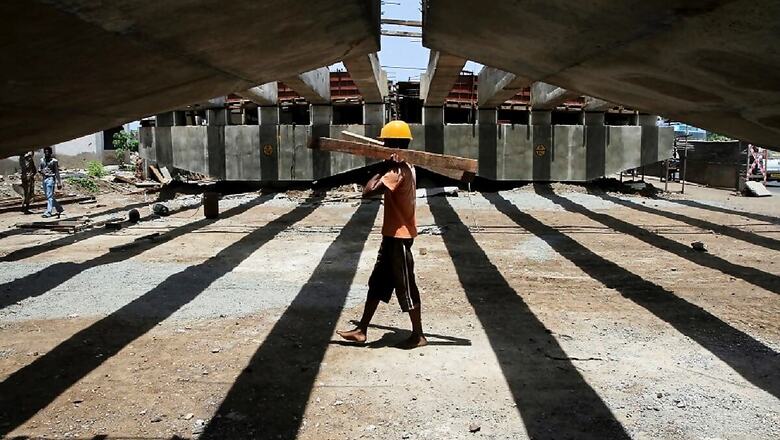
views
India's economy is expected to contract 10.5 per cent in the current fiscal before bouncing back in the next financial year, Fitch Ratings said on Tuesday. India's gross domestic product (GDP) contracted by a massive 23.9 per cent in April-June and some agencies have predicted negative growth even during the July-September quarter of the current fiscal (April 2020 to March 2021).
"GDP should rebound strongly in 3Q20 (October-December) amid a re-opening of the economy, but there are signs that the recovery has been sluggish and uneven," Fitch said in its Global Economic Outlook (GEO). It slashed its GDP forecast for the current fiscal to 10.5 per cent, a huge revision of (-) 5 percentage points compared to the June GEO.
The economy, it said, will recover to 11 per cent in 2021-22 largely owing to base effect and grow by 6 per cent in the following year. Separately, India Ratings and Research, the domestic arm of rating agency Fitch, projected an 11.8 per cent contraction in the Indian economy in FY21, as against its previous projection of 5.3 per cent contraction in the current fiscal.
Indian economy had grown at 4.2 per cent in the 2019-20 fiscal. It projected an 11.9 per cent contraction in the current quarter, followed by a (-) 6.7 per cent growth in the December quarter and 5.4 per cent in the following three months.
According to India Ratings, GDP will bounce back to 9.9 per cent growth in FY22 helped mainly by a weak base of FY21. It estimated economic loss in FY21 at Rs 18.44 lakh crore. In another report, Morgan Stanley projected a contraction of 5 per cent in the Indian economy in calendar year 2020 from 4.9 per cent in 2019. The economy will, however, bounce to 9.5 per cent growth in 2021, it said, predicting that a V-shaped recovery in the global economy was playing out faster than originally thought.
"global synchronous recovery should take hold, with all engines of the global economy registering strong growth," it said. "Risks to our view include a potential aggressive lockdown in the winter and uncertainty about fiscal policy." India Ratings projected fiscal deficit expanding to 8.2 per cent of GDP in FY21, from 4.6 per cent in the previous fiscal. Fitch Solutions, an affiliate of Fitch Ratings, revised its FY2020-21 central government fiscal deficit forecast to 8.2 per cent of GDP, from 7.2 per cent previously.
In the September GEO, Fitch Ratings said India, UK (-21.7 per cent) and Spain (-22.1 per cent) were the nations that saw the deepest recessions in April-June. "GDP destruction was felt far and wide," it said adding the coronavirus pandemic has become more prevalent in emerging market countries excluding China as the year has progressed.
"India imposed one of the most stringent lockdowns worldwide in 2Q20 (April-June) and domestic demand fell massively. Limited fiscal support, fragilities in the financial system, and a continued rise in virus cases hamper a rapid normalisation in activity," it noted. "We do not expect GDP to return to pre-virus levels until 1Q22," it said.
During April-June, Fitch said India saw all demand components except government consumption fall massively. "Private consumption lost more than 27 per cent quarter-on-quarter (QoQ), investment slumped an eye-watering 43 per cent QoQ." While GDP should rebound strongly in the next quarter, still-depressed levels of imports, two-wheeler sales, and capital goods production indicate a muted recovery in domestic spending, it said. Fitch said, the continued spread of the virus and the imposition of sporadic shutdowns across the country depress sentiment and disrupt economic activity.
"The severe fall in activity has also damaged household and corporate incomes and balance sheets, amid limited fiscal support. A looming deterioration in asset quality in the financial sector will hold back credit provision amid weak bank capital buffers," it said. Furthermore, high inflation has added strains to household income. Supply-chain disruptions and excise duties increases have caused prices to rise.
"However, we expect inflation to slow amid weak underlying demand, an easing in supply-chain disruptions and agood monsoon," it added. In another report, Goldman Sachs cut its FY21 India GDP forecast to a contraction of 14.8 per cent.
It had earlier estimated the economy of the country, which is now home to the second largest number of COVID-19 infections, to contract by 11.8 per cent. "India's GDP hit from COVID-19 the highest across major economies," analysts at the brokerage said.















Comments
0 comment